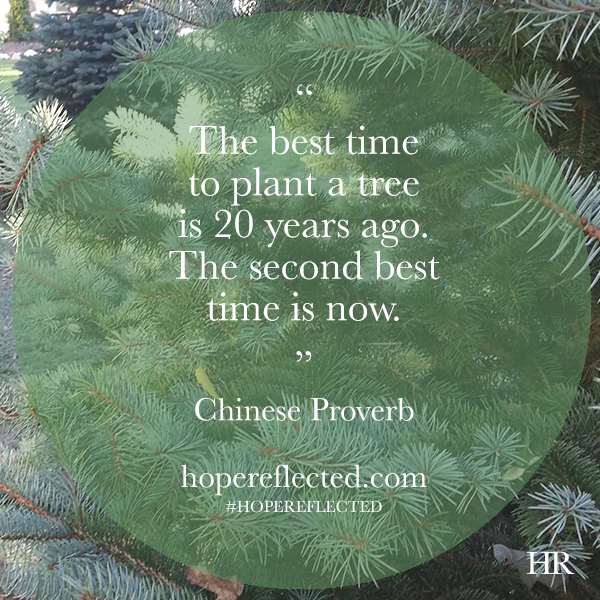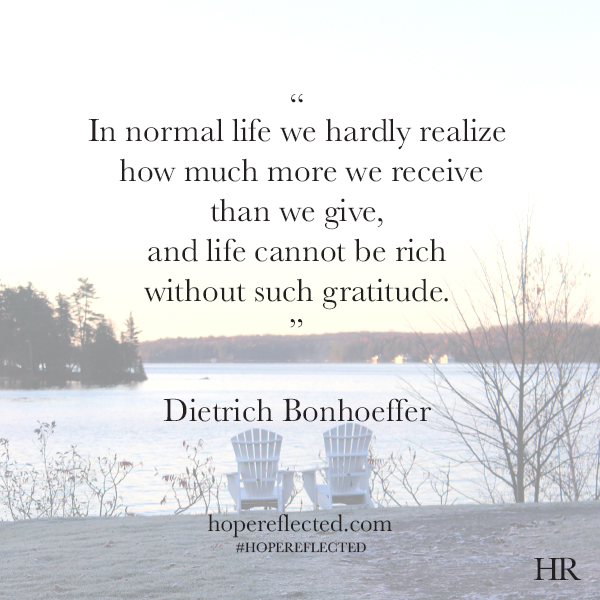Hope Reflected: What Goes In, Must Come Out
Written by H, Posted in Christian Living, Published Work
Whether it’s the snow melting, or the birds singing, several people have said over the past week that they’re feeling invigorated and inspired.
Inspire. What a word! First used in the 1300s, the word inspire comes from the Latin inspirare, meaning, “inspire, inflame, blow into,” from in “in” and spirare “to breathe”.[1] Another definition comes from the French inspiracion, meaning “inhaling, breathing in; inspiration.” When we are inspired – whether by a person, place, or thing, – we are stimulated, excited, and influenced. The word inspire is the breathing in of something and actually being affected by it. When it’s put in such vivid terms, I can’t help but think about what inspires me. There are so many people, so many places, and so many things that I would count as inspirations. And while I’m a person who by nature has a fairly positive outlook on life (my name is Hope, hello), I can’t help but think about what inspires angry people, or those with a particularly pessimistic attitude. Sure, some of it might be built into their nature, but ultimately, we’re all influenced and inspired in some way, by something.
If you’re a computer science type, you’re familiar with GIGO (garbage in, garbage out). The information a computer outputs depends entirely on the input. Not to draw a parallel between computers and humans, but same story when it comes to us. What we allow into our minds and our hearts through the gates of our eyes and our ears will inevitably come out and be displayed through our actions and the words that come out of our mouths. Have you ever met someone who has a bad attitude or who’s “mad at the world”? Chances are, they really don’t censor much of what they let their eyes see and their ears hear. If you listen to intense, anger-filled music, be prepared to have an intense, angry outlook. Watch violent and profanity-filled films? You put yourself at risk to become desensitized, or even a producer of those behaviors and words in your own life. It’s like food poisoning, really. If you eat contaminated food, well, be prepared for what’s going to come out…
It’s inevitable through life that we’re going to see things that we’d rather not see, and hear things we’d rather not hear, but does that mean we shouldn’t be proactive and protect ourselves? Absolutely not! We should all establish safeguards against potential negative influences. If you know that certain genres of music elicit feelings of depression, anger, or sadness in you, don’t listen to that music! Same with movies and TV; if you know that show will cause you to think about things you’d rather not consider, then don’t watch it. Each of us has a responsibility to protect and nurture our hearts and minds. That goes for real life, too. If you’re someone who enjoys listening to the “coffee shop talk” and hearing critical assessments of your peers, you put yourself at risk to pick out the faults in others and speak critically. If you wouldn’t say it to that person’s face, you definitely shouldn’t be saying it behind his or her back.
Just like the law of gravity, (what goes up must come down), we’ve all got to be careful the spiritual truth of what goes in must come out. There’s a verse that I love that talks about dwelling on the right things. In chapter 4 verse 8 of the apostle Paul’s letter to the Philippians, he encourages them to think positively, “Finally, brethren, whatever things are true, whatever things are noble, whatever things are just, whatever things are pure, whatever things are lovely, whatever things are of good report, if there is any virtue, and if there is anything praiseworthy – mediate on these things.”
Originally published as “What Goes In Must Come Out”. Minto Express. March 25, 2015: 5. Print.
[1] inspire. Dictionary.com. Dictionary.com Unabridged. Random House, Inc. http://dictionary.reference.com/browse/inspire (accessed: March 20, 2015).






![False friends or counterfeit kindness; whatever you want to call it, the world is filled with people who will say one thing to your face and then another behind your back; people who will woo you in order to get something from you.
It’s sad, but it’s true.
The Bible provides us with examples from Joab to Judas, and yet, we’re surprised when we find ourselves deceived and hurt by someone else.
So what are some of the hallmarks of a true friend?
You can read more about this on hopereflected.com [Link in profile]
.
.
.
#friends #friendship #kindness #counterfeitkindness #hurt #proverbs #truefriends #hopereflected #blog #blogpost](https://www.hopereflected.com/wp-content/plugins/instagram-feed/img/placeholder.png)